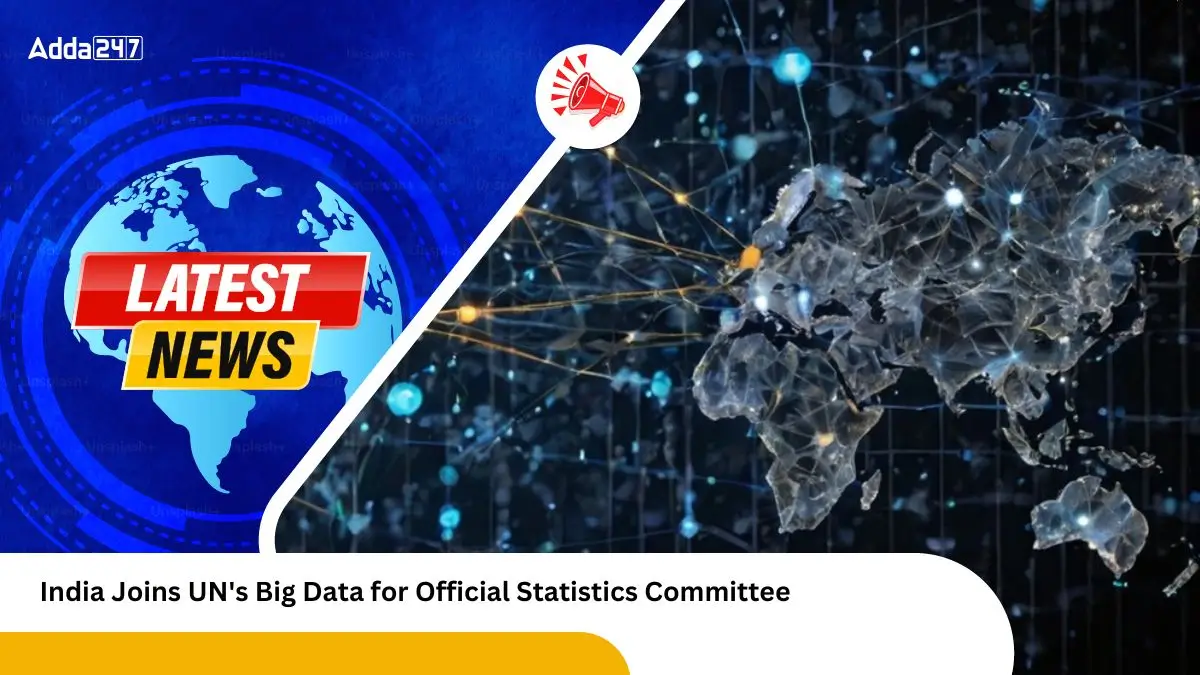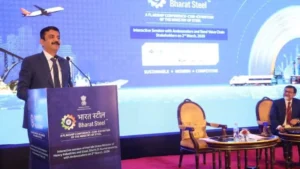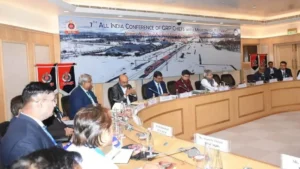India has joined the United Nations Committee of Experts on Big Data and Data Science for Official Statistics (UN-CEBD), marking a significant step in the country’s growing influence in global statistical frameworks. This membership demonstrates India’s commitment to leveraging Big Data and technology for evidence-based policymaking. The committee focuses on exploring how Big Data and data science can be utilized to improve official statistics and track sustainable development goals (SDGs).
This development aligns with India’s efforts to modernize its statistical processes by integrating non-traditional data sources like satellite imagery, IoT (Internet of Things), and machine learning for accurate and real-time insights to support governance.
Key Highlights
India’s Membership in UN-CEBD
- India has been inducted into the UN Committee of Experts on Big Data and Data Science for Official Statistics (UN-CEBD).
- The committee explores how Big Data can improve official statistics and SDG monitoring.
- India’s membership highlights its growing role in global statistical governance.
India’s Contribution to the UN-CEBD
- India will help shape global standards and best practices in using Big Data for official statistics.
- The Ministry of Statistics and Programme Implementation (MOSPI) will play a key role in representing India’s initiatives.
- The Data Innovation Lab and alternate data sources like satellite imagery and machine learning will be showcased as India’s contributions.
India’s Innovations in Big Data for Statistics
- Data Innovation Lab: A government initiative to explore new data collection techniques.
- Satellite Imagery & IoT: Being used to modernize statistical processes and enhance the accuracy of estimates.
- Machine Learning & AI: Helping to reduce time lags in data collection and provide real-time insights.
Strategic Importance for India
- This engagement will allow India to align its domestic advancements in Big Data with international goals.
- India’s participation will enhance decision-making by providing policymakers with real-time, evidence-based insights.
- It will help address socio-economic challenges through timely availability of critical data.
India’s Role in Driving Innovation in Data Science
- India aims to reduce the time lag in data availability and improve data accuracy.
- It will contribute to international frameworks and policy innovation in data science.
- The focus will be on using non-traditional data streams to enhance socio-economic planning and governance.
What is Big Data?
- Big Data is characterized by,
- High Volume: Large amounts of data generated every second.
- High Velocity: Data is produced at an unprecedented speed.
- Wide Variety: Data comes from various sources in different formats.
UN-CEBD Formation
- Established by the UN Statistical Commission in its 45th session.
- Created to investigate the benefits and challenges of Big Data for official statistics.
- Focuses on monitoring and reporting sustainable development goals (SDGs) using Big Data.
Key Issues Addressed by UN-CEBD
- The committee works on tackling several issues related to Big Data usage in official statistics,
- Methodology: Ensuring statistical methods are adapted to handle Big Data.
- Quality: Maintaining data accuracy and reliability.
- Technology: Leveraging advanced tools and platforms for data processing.
- Data Access: Ensuring fair and secure access to data sources.
- Legislation and Privacy: Protecting individuals’ privacy while using Big Data.
- Management and Finance: Efficiently managing the costs of implementing Big Data solutions.
Benefits of Big Data in Official Statistics
- Integration of Non-Traditional Data Sources: Use of private sector data, IoT, and satellite imagery.
- Real-Time Insights: Policymakers can access up-to-date data for evidence-based decision-making.
- Enhanced Accuracy: Big Data will improve the precision and timeliness of statistical estimates.
- Innovative Data Collection Methods: Use of advanced technologies to streamline statistical production.
| Summary/Static | Details |
| Why in the news? | India Joins UN’s Big Data for Official Statistics Committee |
| UN Committee | United Nations Committee of Experts on Big Data and Data Science for Official Statistics (UN-CEBD) |
| India’s Membership | Joined in January 2025 to contribute to global statistical practices |
| Key Contribution | Shaping global standards for using Big Data in official statistics |
| India’s Innovations | Data Innovation Lab, use of satellite imagery, machine learning |
| Benefits of Big Data | Enhances real-time insights, reduces time lag, improves data accuracy |
| Strategic Importance | Aligns domestic advancements with global goals for evidence-based policymaking |
| Non-Traditional Data Sources | IoT, satellite imagery, private sector data to modernize statistical processes |
| Policymaking Impact | Provides real-time insights to address socio-economic challenges |
| SDG Monitoring | Helps in tracking and reporting on sustainable development goals |
| What is Big Data? | High-volume, high-velocity, and wide-variety digital information generated from GPS, ATMs, sensors, satellites, etc. |
| Sources of Big Data | GPS devices, ATMs, scanning devices, sensors, mobile phones, satellites, social media |
| UN-CEBD Formation | Established by the UN Statistical Commission during its 45th session |
| Purpose of UN-CEBD | To explore benefits and challenges of Big Data for official statistics and SDG monitoring |
| Key Issues Addressed | Methodology, quality, technology, data access, legislation, privacy, management, and finance |
| Benefits of Big Data | Real-time insights, monitoring SDGs, timely policy interventions, cost-effective solutions |
| Focus Areas |
Cost-benefit analysis of Big Data usage in official statistics
|



 India to Host Bharat Steel Summit in New...
India to Host Bharat Steel Summit in New...
 7th All India Conference of GRP Chiefs C...
7th All India Conference of GRP Chiefs C...
 MoEFCC to Organise ‘Him-CONNECT’ at WSDS...
MoEFCC to Organise ‘Him-CONNECT’ at WSDS...








